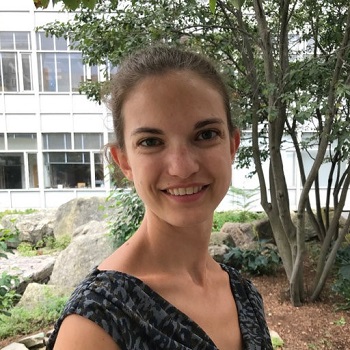Superfund Research Program

Jennifer Kay, Ph.D., is the 23rd recipient of the Karen Wetterhahn Memorial Award. Presented December 14 during the virtual 2020 SRP Annual Meeting, the award honors a graduate or postdoctoral researcher demonstrating scientific excellence.
Kay’s research evaluates how genetic factors affect susceptibility to mutations and cancer following exposure to N-nitrosodimethylamine (NDMA), a contaminant found near a Superfund site in Wilmington, Massachusetts.
Kay was a postdoctoral fellow in the Bevin P. Engelward, Sc.D., Lab at the Massachusetts Institute of Technology (MIT). She also directed the MIT SRP Center Research Translation Core. As the core’s leader, she ran a blog that describes many of the key research, engagement, and translation activities of the MIT SRP Center, and she wrote two articles targeted for a lay public about the center’s research.
“I find my research and research translation roles exceptionally suit my interests in protecting people from disease and communicating science to a multitude of audiences,” said Kay.
For decades, a series of manufacturers dumped chemical waste into unlined pits at the Superfund site that Kay studies. NDMA, which is classified as a probable carcinogen, formed as a degradation byproduct.
Kay and her colleagues are preparing to publish results of studies that provide integrated understanding of the mechanisms leading from exposure to disease. These would form the basis for potentially stratifying exposed populations into low- and high-risk categories based on DNA repair capacity. These experiments have revealed exciting findings, not just about NDMA-induced disease based on different genetic profiles, but also fundamental understandings about the relative contributions of specific DNA lesions to toxicity, mutations, and cancer.
“Given the importance of NDMA as a contaminant in the environment, in drinking water, and in food, Jennifer’s contributions to our understanding of the molecular mechanisms of NDMA-induced mutations and cancer contribute fundamentally to our ability to intervene,” said Engelward. “Her studies of gene-environment interactions are critical to our ability to identify susceptible individuals based on their DNA repair capacity.”
In addition to her research at MIT, Kay mentored women and underrepresented minority trainees in the early and most formative stages of their careers. She has also been the leader in critical engagement and translation activities that support environmental justice communities and indigenous people.
“Jenny is an excellent match for the Wetterhahn Award because she represents, in one person, all of the dimensions of a Superfund program,” said SRP researcher John Essigmann. “I knew Karen Wetterhahn well, and Jenny reminds me a lot of Karen in her ability to do basic science that has impact on people and her natural ability to connect people.”
Kay has now transitioned to a research scientist position with Silent Spring Institute. In this role, she will direct research projects investigating how environmental exposure to endocrine-disrupting chemicals contribute to cancer and other diseases.


